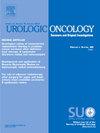Evaluating surrogates for overall survival in the adjuvant treatment of bladder cancer with chemotherapy
IF 2.3
3区 医学
Q3 ONCOLOGY
Urologic Oncology-seminars and Original Investigations
Pub Date : 2025-08-21
DOI:10.1016/j.urolonc.2025.07.013
引用次数: 0
Abstract
Introduction
Surrogates for overall survival (OS) can expedite the development of adjuvant treatments for bladder cancer. We evaluated whether disease-free survival (DFS) or distant metastasis-free survival (DMFS) are valid surrogates for OS in patients with muscle-invasive disease treated with cisplatin-based chemotherapy after radical cystectomy.
Methods
We analyzed individual patient data from 1075 patients enrolled in 9 randomized controlled trials (RCTs) identified by systematic review. These RCTs compared adjuvant cisplatin-based chemotherapy combined with local treatment versus local treatment alone and excluded neoadjuvant chemotherapy. We measured the patient-level association between DFS/DMFS and OS using Spearman’s correlation coefficient (ρ), and the trial-level association between hazard ratios (HRs) using R2. For both measures, values close to 1.00 are required for surrogate validation. We assessed the intent-to-treat (ITT) populations and subgroups defined by lymph node status.
Results
The evaluation of DFS in the ITT population showed ρ = 0.89 (95% confidence interval [CI] 0.87–0.90) and R2 = 0.69 (95% CI, 0.34–1.00). Corresponding measures for DMFS were ρ = 0.91 (95% CI, 0.89–0.92) and R2 = 0.90 (95% CI, 0.74–1.00). Patient-level associations were moderate or strong regardless of the lymph node status. At the trial level, DFS displayed weak association with OS in lymph node–positive patients, but associations were strong for lymph node–negative patients and for DMFS.
Conclusion
In the adjuvant treatment of bladder cancer with cisplatin-based chemotherapy, DFS is a moderate to strong surrogate for OS, while DMFS is a strong surrogate for OS.
评估膀胱癌化疗辅助治疗中替代药物的总生存率。
总生存期(OS)的替代物可以加速膀胱癌辅助治疗的发展。我们评估了在根治性膀胱切除术后接受顺铂化疗的肌肉侵袭性疾病患者的无病生存期(DFS)或远端无转移生存期(DMFS)是否是OS的有效替代指标。方法:我们分析了通过系统评价确定的9项随机对照试验(rct)中1075名患者的个体患者资料。这些随机对照试验比较了以顺铂为基础的辅助化疗联合局部治疗与单独局部治疗,并排除了新辅助化疗。我们使用Spearman相关系数(ρ)测量DFS/DMFS与OS在患者水平上的相关性,使用R2测量危险比(hr)在试验水平上的相关性。对于这两个度量,需要接近1.00的值来进行代理验证。我们评估了意向治疗(ITT)人群和按淋巴结状态定义的亚组。结果:ITT人群的DFS评价结果为ρ = 0.89(95%可信区间[CI] 0.87 ~ 0.90), R2 = 0.69 (95% CI, 0.34 ~ 1.00)。相应的DMFS测量值为ρ = 0.91 (95% CI, 0.89-0.92), R2 = 0.90 (95% CI, 0.74-1.00)。无论淋巴结状况如何,患者水平的相关性都是中等或强烈的。在试验水平上,淋巴结阳性患者的DFS与OS的相关性较弱,而淋巴结阴性患者和DMFS的相关性较强。结论:在以顺铂为基础的化疗辅助治疗膀胱癌中,DFS为OS的中强替代,DMFS为OS的强替代。
本文章由计算机程序翻译,如有差异,请以英文原文为准。
求助全文
约1分钟内获得全文
求助全文
来源期刊
CiteScore
4.80
自引率
3.70%
发文量
297
审稿时长
7.6 weeks
期刊介绍:
Urologic Oncology: Seminars and Original Investigations is the official journal of the Society of Urologic Oncology. The journal publishes practical, timely, and relevant clinical and basic science research articles which address any aspect of urologic oncology. Each issue comprises original research, news and topics, survey articles providing short commentaries on other important articles in the urologic oncology literature, and reviews including an in-depth Seminar examining a specific clinical dilemma. The journal periodically publishes supplement issues devoted to areas of current interest to the urologic oncology community. Articles published are of interest to researchers and the clinicians involved in the practice of urologic oncology including urologists, oncologists, and radiologists.

 求助内容:
求助内容: 应助结果提醒方式:
应助结果提醒方式:


